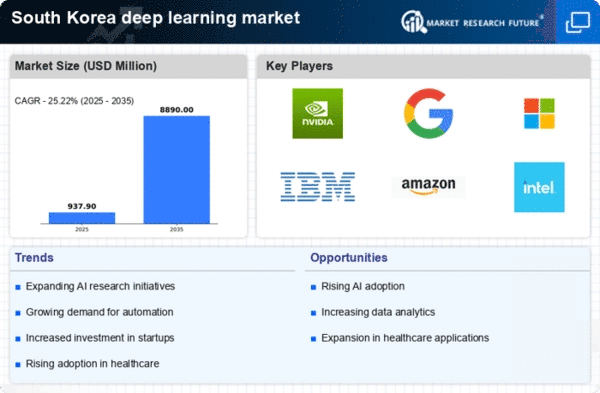Growth of Data Generation
The exponential growth of data generation in South Korea significantly impacts the deep learning market. With the proliferation of IoT devices, social media, and digital transactions, vast amounts of data are being produced daily. This data serves as a critical resource for training deep learning models, enhancing their accuracy and effectiveness. In 2025, it is estimated that data generation will increase by 40%, providing a rich foundation for deep learning applications. Consequently, businesses are increasingly leveraging this data to gain insights and improve decision-making processes, thereby driving the demand for deep learning technologies.
Rising Demand for Automation
The deep learning market in South Korea experiences a notable surge in demand for automation across various sectors. Industries such as manufacturing, finance, and retail are increasingly adopting deep learning technologies to enhance operational efficiency and reduce costs. For instance, the automation of customer service through chatbots and virtual assistants is becoming commonplace, leading to improved customer satisfaction. According to recent data, the automation sector is projected to grow by approximately 30% annually, indicating a robust appetite for deep learning solutions. This trend suggests that businesses are recognizing the potential of deep learning to streamline processes and drive innovation, thereby propelling the deep learning market forward.
Government Support and Initiatives
The South Korean government plays a pivotal role in fostering the deep learning market through various support initiatives. Substantial investments in research and development, alongside funding for AI-related projects, are indicative of the government's commitment to advancing technology. In 2025, the government allocated over $1 billion to AI research, with a significant portion directed towards deep learning applications. This financial backing not only stimulates innovation but also encourages collaboration between academia and industry. As a result, the deep learning market is likely to benefit from a well-supported ecosystem that nurtures talent and accelerates technological advancements.
Advancements in Hardware Capabilities
The deep learning market in South Korea is witnessing rapid advancements in hardware capabilities, which are essential for processing complex algorithms efficiently. The development of specialized hardware, such as GPUs and TPUs, has significantly enhanced the performance of deep learning models. In 2025, the market for AI hardware is expected to reach $5 billion, reflecting the growing need for powerful computing resources. These advancements enable organizations to deploy deep learning solutions at scale, facilitating real-time data processing and analysis. As a result, the deep learning market is likely to expand as businesses seek to harness the power of cutting-edge hardware.
Increased Adoption in Financial Services
The financial services sector in South Korea is increasingly adopting deep learning technologies to enhance risk management and fraud detection. Financial institutions are leveraging deep learning algorithms to analyze vast datasets, identify patterns, and make informed decisions. In 2025, it is projected that the adoption of deep learning in financial services will grow by 25%, driven by the need for improved security and efficiency. This trend indicates a shift towards data-driven decision-making, where deep learning plays a crucial role in optimizing operations and mitigating risks. Consequently, the deep learning market is poised for growth as financial institutions recognize the value of these advanced technologies.
















